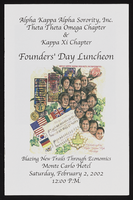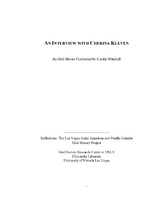Search the Special Collections and Archives Portal
Search Results

Jill Roberts oral history interview: transcript
Date
Archival Collection
Description
Oral history interview with Jill Roberts conducted by Barbara Tabach and Claytee D. White on March 20, 2018 for the Remembering 1 October Oral History Project. In this interview, Jill Roberts discusses her position as the CEO of the Trauma Intervention Program (TIP) of Southern Nevada. She also delves into her part-time work at the coroner's office as a death investigator and discusses her personal background in Las Vegas, Nevada after she moved to the city in 1977. She describes the role TIP had during the aftermath of the October 1, 2017 mass shooting, where well-trained volunteers were dispatched to hotels, hospitals, and anywhere else the survivors reached in order to provide emotional and practical support. Throughout the interview, Roberts emphasizes that the assistance provided to those in a traumatic event depends on each individual's needs. She shares a few examples of what the TIP volunteers had helped with after the shooting, including listening to the survivors' stories as well as providing information on the situation, helping separated loved ones find each other, arranging travel for some survivors to go back to their homes, and procuring clothes and shoes for those who needed them. Roberts also discusses the gratitude TIP had received after the shooting, including the thank you cards sent by Sandy Hook High School.
Text

Christina Gruber oral history interview: transcript
Date
Archival Collection
Description
Oral history interview with Christina Gruber conducted by Barbara Tabach on March 2, 2019 for the Remembering 1 October Oral History Project. In this interview, Gruber shares her experience living in Las Vegas, Nevada since 1997 and as a Certified Public Accountant (CPA), mother of two, and physical fitness enthusiast. She recalls being shot during the Route 91 Harvest Festival and being rescued by strangers. She recalls the chaos of the evening, but also how strangers worked together to comfort each other amidst the terror. She discusses dedicated her athletic races to those who were murdered that evening, and how it has helped her recovery.
Text

James Dean Leavitt oral history interviews: transcript
Date
Archival Collection
Description
Oral history interviews with James Dean Leavitt conducted by Claytee D. White on September 27 and October 4, 2022 for the Boyer Early Las Vegas Oral History Project. In this interview, Leavitt recalls his role in establishing a medical school at the University of Nevada, Las Vegas (UNLV), now known as Kirk Kerkorian School of Medicine. Leavitt was elected to the Board of Regents in 2004 while Jim Rogers was interim Chancellor of the Nevada System of Higher Education (NSHE), and he suggested the creation of an ad hoc committee Health Science Center Committee. In 2009, Leavitt became Chairman of the Board of Regents, Dan Klaich became Chancellor, and in the following year, Dr. Mark Doubrava joined the board. In May 2014, the planning dean was hired, Dr. Barbara Atkinson, and the UNLV School of Medicine was officially established on August 22, 2014.
Text

Alpha Kappa Alpha Sorority, Theta Theta Omega Chapter Founders' Day committee reports
Date
Archival Collection
Description
From the Alpha Kappa Alpha Sorority, Incorporated, Theta Theta Omega Chapter Records (MS-01014) -- Chapter records file.
Text

Cherina Kleven oral history interview: transcript
Date
Archival Collection
Description
Oral history interview with Cherina Kleven conducted by Cecilia Winchell on June 9, 2021 for Reflections: The Las Vegas Asian American and Pacific Islander Oral History Project. Cherina Kleven talks about her family and childhood growing up in Taiwan amongst six siblings. She shares her family's history and how they immigrated to Las Vegas while she was a teen, as well as her employment history and how she met her husband. Cherina talks about racial and gender discrimination and the obstacles she has overcome to be the only working female in her family, the only woman firefighter at her station house, and the first female Asian American Assistant Fire Chief in the United States.
Text

Mike Meade interview, February 28, 1977: transcript
Date
Archival Collection
Description
On February 28, 1977, collector Steve Gortz interviewed Mike Meade (b. September 16, 1950 in San Francisco, California) about his life in Nevada. Meade speaks about growing up in Tonopah, Nevada before its decline in population, his move to Elko, Nevada and eventually to the city of Las Vegas. Moreover, he talks about the development of the Strip, the differences between Las Vegas and rural Nevada, as well as the changing environmental landscape. Meade also spends time discussing the controversy surrounding the University of Nevada, Las Vegas (UNLV) dormitory at the time of this interview, the attitude of locals, and his opinion on brothels and prostitution. Lastly, Meade talks about the city’s pollution, the sports and recreation throughout the whole of the state and ends by reading a poem about Nevada from a Bicentennial book.
Text

Barbara Millington interview, March 2, 1980: transcript
Date
Archival Collection
Description
On March 2, 1980, collector David Mowrey interviewed Barbara Millington (born July 3rd, 1937 in Oak Creek, Colorado) at her home in Las Vegas, Nevada. In this interview, Mrs. Millington discusses moving to Las Vegas, Nevada with her family and working various jobs including at Vegas Village and becoming a bookkeeper at a construction firm. She also speaks about the changes she has seen in Las Vegas, such as how casinos were when she first came here compared to how they are now. She ends the interview talking about the need for Las Vegas to find industry outside of gaming. She discusses the need for young people to come back after going away to college to improve the city.
Text

Mario Sandoval interview, December 6, 2018: transcript
Date
Archival Collection
Description
Interviewed by Claytee White. Mario and his six siblings were reared by a single mother who taught him all of the family recipes. Moving to Las Vegas at four years of age Mario remembers moving into a black neighborhood where the family was not welcomed. All windows in their home were broken into the first night. The family moved the next day. Though the new house was still in an African American neighborhood, they were protected by Vera, their black babysitter. Mario developed the intense work ethic of his mother, and after working in several strip casinos, found his home at the Horseshoe, today's Binion's. He has been there for 33 years; first as a busboy and then becoming a waiter. He is a Culinary Union trained shop student who picketed his beloved work place for ten months during a 1980's labor dispute. His work in life and union benefits have made his a very good life.
Text

Guadalupe Meza Redmond interview, December 7, 2018: transcript
Date
Archival Collection
Description
Interviewed by Claytee White. Rodrigo Vazquez also participated in the questioning. Guadalupe Redmond lived a wonderful life in Mexico while growing up. When Guadalupe was 17, her mother decided to immigrate the family to Las Vegas, Nevada, Guadalupe did not want to move but reluctantly did so. She taught herself English by watching TV. Then she decided she wanted to work and became a guest room attendant working downtown and on the Strip - Sundance (Fitzgerald's, now the D), Stratosphere, Aladdin, Planet Hollywood, Riviera, Hacienda - to name a few. As she moved about, she began to understand the importance of the Culinary Union Local 226. She is now an organizer who in 1989 participated in a 10-month Work and Walk strategy that was successful.
Text

Transcript of interview with Harold R. Hunter by Philip John Mile, March 19, 1978
Date
Archival Collection
Description
On March 19, 1978, Philip John Mile interviewed former chef, Harold R. Hunter (born 1901 in Norwich, Kansas) about his life in Southern Nevada. Hunter discusses his different experiences working in early Las Vegas restaurants during the thirties and forties. Hunter also discusses the rapid growth of the Mormon community during this time.
Text
